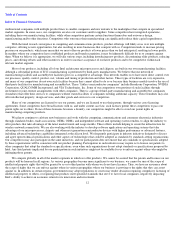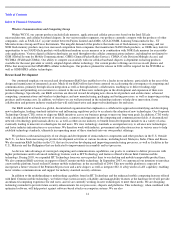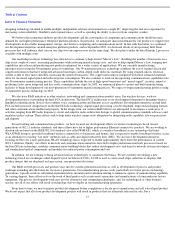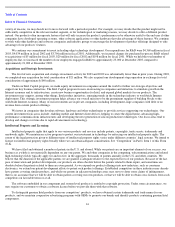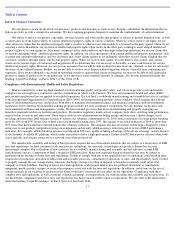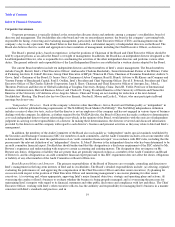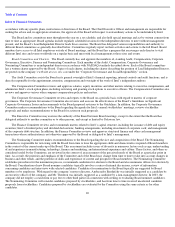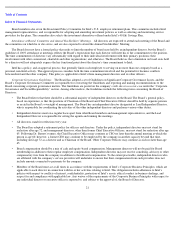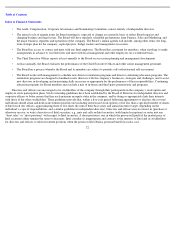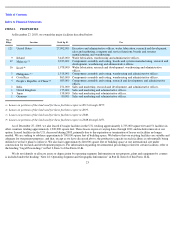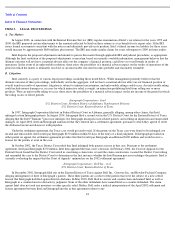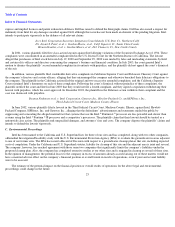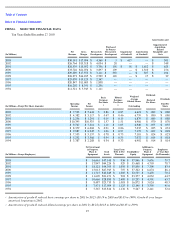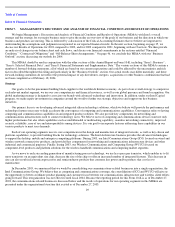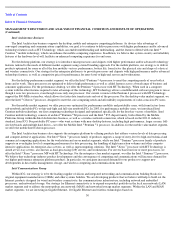Intel 2003 Annual Report Download - page 23
Download and view the complete annual report
Please find page 23 of the 2003 Intel annual report below. You can navigate through the pages in the report by either clicking on the pages listed below, or by using the keyword search tool below to find specific information within the annual report.
Table of Contents
Index to Financial Statements
accordance with any specific plans, instructions or directions of the Board. The Chief Executive Officer and management are responsible for
seeking the advice and, in appropriate situations, the approval of the Board with respect to extraordinary actions to be undertaken by Intel.
The Board and its committees meet throughout the year on a set schedule, and also hold special meetings and act by written consent from
time to time as appropriate. Board agendas include regularly scheduled sessions for the independent directors to meet without management
present, and the Board’s Lead Independent Director leads those sessions. The Board has delegated various responsibilities and authority to
different Board committees as generally described below. Committees regularly report on their activities and actions to the full Board. Board
members have access to all Intel employees outside of Board meetings, and the Board has a program that encourages each director to visit
different Intel sites and events worldwide on a regular basis and meet with local management at those sites and events.
Board Committees and Charters. The Board currently has, and appoints the members of, standing Audit, Compensation, Corporate
Governance, Executive, Finance and Nominating Committees. Each member of the Audit, Compensation, Corporate Governance and
Nominating Committees is an independent director in accordance with NASDAQ standards described above. Each of the Board committees
has a written charter approved by the Board. Copies of each charter, including the charter describing the position of Lead Independent Director,
are posted on the company’s web site at www.intc.com under the “Corporate Governance and Social Responsibility” section.
The Audit Committee assists the Board in its general oversight of Intel’s financial reporting, internal controls and audit functions, and is
directly responsible for the appointment, retention, compensation and oversight of the work of Intel’s independent auditors.
The Compensation Committee reviews and approves salaries, equity incentives and other matters relating to executive compensation, and
administers Intel’s stock option plans, including reviewing and granting stock options to executive officers. The Compensation Committee also
reviews and approves various other company compensation policies and matters.
The Corporate Governance Committee reviews and reports to the Board on a periodic basis with regard to matters of corporate
governance. The Corporate Governance Committee also reviews and assesses the effectiveness of the Board’s Guidelines on Significant
Corporate Governance Issues and recommends to the Board proposed revisions to the Guidelines. In addition, the Corporate Governance
Committee makes recommendations to the Board regarding the agenda for Intel’s annual stockholders’ meetings, reviews stockholder
proposals and makes recommendations to the Board for action on such proposals.
The Executive Committee may exercise the authority of the Board between Board meetings, except to the extent that the Board has
delegated authority to another committee or to other persons, and except as limited by Delaware law.
The Finance Committee reviews and recommends matters related to Intel’s capital structure, including the issuance of debt and equity
securities; Intel’s dividend policy and dividend declarations; banking arrangements, including investment of corporate cash; and management
of the corporate debt structure. In addition, the Finance Committee reviews and approves structured finance and other cash management
transactions whose authorization is not otherwise approved by the Board or delegated to Intel’s management.
The Nominating Committee makes recommendations to the Board regarding the size and composition of the Board. The Nominating
Committee is responsible for reviewing with the Board from time to time the appropriate skills and characteristics required of Board members
in the context of the current make-up of the Board. This assessment includes issues of diversity in numerous factors such as age; understanding
of and experience in manufacturing, technology, finance and marketing; and international experience and culture. These factors, and others as
considered useful by the Committee, are reviewed in the context of an assessment of the perceived needs of the Board at a particular point in
time. As a result, the priorities and emphasis of the Committee and of the Board may change from time to time to take into account changes in
business and other trends, and the portfolio of skills and experience of current and prospective Board members. The Nominating Committee
establishes procedures for the nomination process, recommends candidates for election to the Board and also nominates officers for election by
the Board. Consideration of new Board nominee candidates typically involves a series of internal discussions, review of information
concerning candidates and interviews with selected candidates. Candidates for nomination to the Board typically are suggested by Board
members or by employees. With regard to the company’s newest directors, Ambassador Barshefsky was initially suggested as a candidate by
an executive officer of the company, and Mr. Thornton was initially suggested as a candidate by a non-management director. In 2003, the
company did not employ a search firm or pay fees to other third parties in connection with seeking or evaluating Board nominee candidates.
The Nominating Committee will consider candidates proposed by stockholders, and has from time to time received unsolicited candidate
proposals from stockholders. Candidates proposed by stockholders are evaluated by the Committee using the same criteria as for other
candidates.
20




